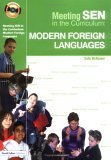

Most ebook files are in PDF format, so you can easily read them using various software such as Foxit Reader or directly on the Google Chrome browser.
Some ebook files are released by publishers in other formats such as .awz, .mobi, .epub, .fb2, etc. You may need to install specific software to read these formats on mobile/PC, such as Calibre.
Please read the tutorial at this link: https://ebookbell.com/faq
We offer FREE conversion to the popular formats you request; however, this may take some time. Therefore, right after payment, please email us, and we will try to provide the service as quickly as possible.
For some exceptional file formats or broken links (if any), please refrain from opening any disputes. Instead, email us first, and we will try to assist within a maximum of 6 hours.
EbookBell Team

4.8
84 reviews
ISBN 10: 1843121654
ISBN 13: 978-1843121657
Author: John Connor
All teachers are meeting more pupils with special needs in mainstream classrooms. Although there are general issues to be aware of subject specialists will always want specific guidance and examples. This series combines SEN expertise with subject knowledge to produce practical and immediate support. Covers:
* Policy writing and how to do it
* Simply explanation of SEN labels
* Creating an inclusive classroom environment
* Working with TA's
Introduction
1. Meeting Special Educational Needs – Your Responsibility
2. Departmental Policy
Where to start when writing a policy
The content of an SEN departmental policy
General statement with reference to the school's SEN policy
Definition of SEN
Provision for staff within the department
Provision for pupils with SEN
Resources and learning materials
Staff qualifications and continuing professional development needs
Monitoring and reviewing the policy
3. Different Types of SEN
Asperger's Syndrome
Attention Deficit Disorder (with or without hyperactivity) (ADD/ADHD)
Autistic Spectrum Disorders (ASD)
Behavioural, emotional and social development needs
Behavioural, emotional, social difficulty (BESD)
Cerebral palsy (CP)
Down's Syndrome (DS)
Fragile X Syndrome
Moderate learning difficulties (MLD)
Physical disability (PD)
Semantic Pragmatic Disorder (SPD)
Sensory impairments
Hearing impairment (HI)
Visual impairment (VI)
Multi-sensory impairment
Severe learning difficulties (SLD)
Profound and multiple learning difficulties (PMLD)
Specific learning difficulties (SpLD)
Dyslexia
Dyscalculia
Dyspraxia
Speech, language and communication difficulties (SLCD)
Tourette's Syndrome (TS)
4. The Inclusive Citizenship Classroom
Why PSHE and citizenship are particularly suited to inclusive education
An important difference between PSHE and citizenship
Some challenges inherent in an inclusive approach to PSHE and citizenship
Realistic demands in terms of language and understanding
How school atmosphere and events can support an active curriculum
Display as a tool for inclusion
Bearing inclusion in mind when choosing appropriate textbooks
How classroom layout can maximise the positive effects of inclusion
Overcoming the problems of storing records and data
The use of ICT to support an inclusive policy in citizenship
Extra-curricular activities and inclusion
5. Teaching and Learning Styles
What makes citizenship and PSHE unique
How citizenship is organised in the original Parliamentary orders
An active approach to becoming informed citizens
Teaching ‘rights and responsibilities’ to an inclusive class
Setting an appropriate homework assignment
Teaching about diversity in a way which promotes inclusion
Profile questions
Considering diversity of language as a citizenship project
Introducing the idea of cultural diversity
Implications of practical work in citizenship for pupils with SEN
How to use research and the internet as a basis for homework
How the citizenship curriculum can have a bearing on the whole school
Working arrangements in class
Modelling social skills
Linking performance management to citizenship/PSHE teaching
6. Monitoring and Assessment
What Ofsted says about monitoring citizenship
Including pupils with learning difficulties in PSHE and citizenship
Developing a method of self-reporting for all pupils in citizenship
When it is impossible to match a pupil with an end of key stage description
The role of citizenship and PSHE in the IEP process
7. Managing Support
What makes pupil support in PSHE and citizenship so valuable
Helping the TA cope with the demands of secondary PSHE
Helping the TA cope with the demands of secondary citizenship
The most important aspects of a supportive role
The importance of the TA's role in monitoring and assessing citizenship
The relationship between PSHE/citizenship departments and their TAs
Helping the TA to develop their abilities in PSHE and citizenship
Appendices
References
Further Reading
curriculum meeting agenda
meeting standards through integrated curriculum
curriculum meeting meaning
curriculum meetings
a representative sent to a meeting
Tags: John Connor, Meeting SEN, Modern Foreign